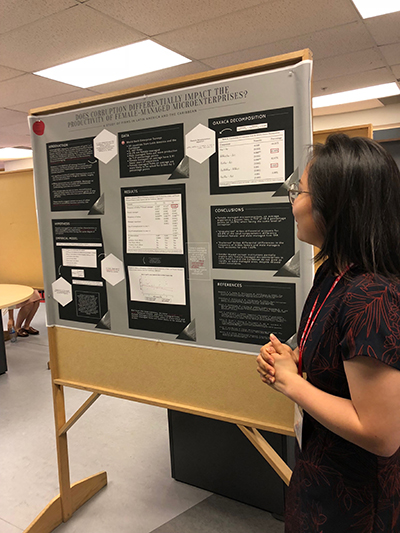In a poster session showcasing undergraduate student research, held at the Canadian Economics Association’s 2018 conference, final year student Minnie Cui won the Best Research Paper Award. Now in its second year, the poster competition invites submissions from undergraduates throughout Canada and an evaluation committee made up of Bank of Canada staff and Canadian academics selects 15 posters to be presented at the CEA conference; from those, two $500 prizes are awarded, for best poster and best research paper. Minnie’s paper, Does corruption differentially impact the productivity of female-managed microenterprises? A study of Latin America and the Caribbean, was written for ECO 499 Honours Essay in Applied Microeconomics, and was supervised by Professor Robert Gazzale with initial input on the formulation of her research question coming from Professors Gustavo Bobonis and Aloysius Siow.
Professor Gillian Hamilton, Associate Chair of Undergraduate Studies, who was on site at the CEA conference, commented that “we’re proud of Minnie’s excellent work — and she did a fantastic job explaining her work at the poster sessions.”
For someone with a clear talent for economics, Minnie’s choice of the subject for her degree came as something of a surprise to her. She had studied economics and math in high school: the lens of economics in particular, she found, “was an interesting way to think about the world and about how things operate. I liked that it taught me a different way of approaching problems.” While she chose to continue with the subjects in her first year at U of T, she arrived at university sure that she was going to major in English. By the end of that year, though, she had decided to specialize in economics. “It just took my brain over,” she laughs.

It turns out that Minnie’s ability to apply herself with stellar results is not confined to the study of economics. She has recently run her first half marathon, having set herself the goal at the end of third year. “I hated running in high school,” she said. “I picked it up again because of that. When I signed up for the half marathon, I thought, ‘if I can run, what can’t I do?’ To go from not even being able to run a kilometer to a half marathon – that will just prove what I can do if I put hard work into something.”
While she has ambitions to attend graduate school, in the short term she wants to see “what an economics degree can help me achieve in the labour market.” And she has plenty of opportunity to do so – she has just accepted the offer of a position as a research assistant with the Bank of Canada’s Economics and Financial Research team. Her level of engagement with government systems, however, is likely to draw her back to the academy before long. “I love politics, and questions relating to state accountability and governance,” she says. “The economic research areas that capture me the most are the ones that actually have policy implications.”
Whichever direction Minnie ultimately takes, it is certain to benefit from her talent, enthusiasm and tenacity. We will undoubtedly be hearing more from her in the future.

